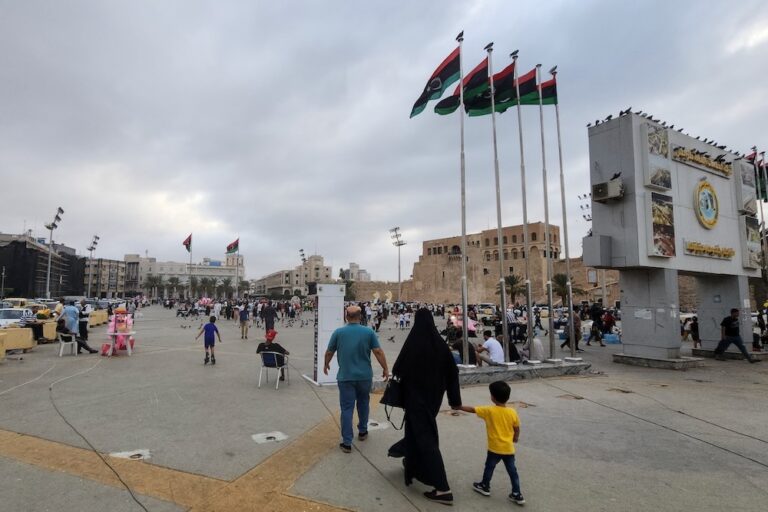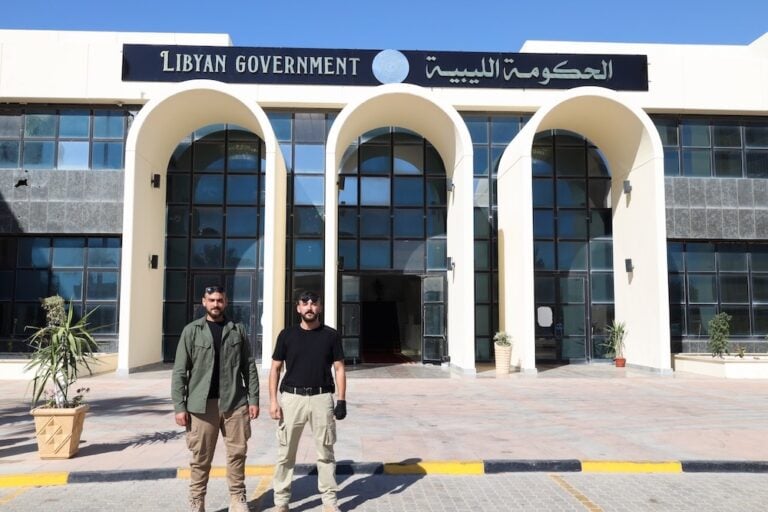Libya's parliament on September 17, 2013, stripped three members of their immunity, leaving them open to potential criminal charges for allegedly defaming political opponents.
Libyan authorities should not act on a criminal defamation complaint brought by one parliamentary faction against three members who criticized that party, Human Rights Watch said today. Libya’s parliament on September 17, 2013, stripped the three members of their immunity, leaving them open to potential criminal charges for allegedly defaming political opponents.
The General National Congress (GNC) voted to lift immunity from prosecution for Hajer Gaid, al-Twati al-Aidha, and Jomaa al-Suweai after lawmakers from the Justice and Construction Party (JCP) accused the three of “defaming and slandering” them during several television appearances. Under Libyan law the loss of immunity paves the way for a potential criminal investigation and prosecution.
“The parliament’s decision to strip the immunity of three of its members is a blatant attempt to restrict political discussion and suppress free speech,” said Joe Stork, acting Middle East and North Africa director at Human Rights Watch. “Parliament members should understand that they are public figures and open to criticism and stop threatening to send one another to prison for their comments.”
Gaid is a member of the National Forces Alliance (NFA), a coalition of more liberal-leaning parties, while al-Aidha and al-Sweai are independent members of parliament. The Justice and Construction Party is close to Libya’s Muslim Brotherhood.
The three lawmakers could face criminal charges based on articles 262 and 439 of the Libyan Penal Code, as stipulated in the general prosecutor’s request to investigate them.
To protect freedom of speech, Libya should eliminate laws that criminalize defamation, including article 439 of the Penal Code, Human Rights Watch said.
While everyone has a right to redress when their reputation has been impugned, the remedies should be limited to civil suits with penalties other than imprisonment. Moreover international standards on freedom of expression stress the importance of the freedom for speech on public affairs, meaning there has to be greater tolerance in the law for criticism of public officials, including members of parliament, than private citizens.
If the prosecutor general brings criminal charges based on article 262, then evidence needs to be produced that the three lawmakers knowingly made [the] false accusations, and these false accusations led to the criminal prosecution of the JCP party members, Human Rights Watch said.
Article 262 of Libya’s Penal Code stipulates sentences of up to life in prison for any person who willfully “accuses another of committing an act that is considered a criminal act under existing laws” while knowing the person is innocent, or by “fabricating a crime” that can lead to criminal indictment of that person. Article 439 stipulates a prison term of up to two years if a person “attacks the reputation of another by defaming them.” This article specifically includes defamation of public officials.
The Justice and Construction Party complaint accuses Gaid, al-Aidha, and al-Sweai of defaming the 18 JCP members by claiming they each received monthly payments of 250,000 Libyan Dinars (approximately US$200,000), from Qatar. The complaint accused al-Aidha of stating he had “proof” that the JCP were “agents of Qatar.” The complaint against al-Sweai accuses him of “inciting the population against the Justice and Construction bloc” by accusing the members of being “behind the recent wave of assassinations in Benghazi,” “leading country into the abyss,” and stealing public funds.
Gaid told Human Rights Watch that article 14 of Libya’s Constitution should protect her freedom of speech and opinion from prosecution. She acknowledged that she had accused Qatar of interfering in Libyan affairs and paying off officials, and said she had proof to back up the charge, but she denied leaking or publishing any documents regarding the accusations.
Libya is a party to the International Covenant on Civil and Political Rights and the African Charter on Human and People’s Rights, both of which protect the right to freedom of expression. Libya’s provisional constitutional covenant states in article 14 that the state “shall ensure freedom of opinion, freedom of speech for individuals and groups, freedom of scientific research, freedom of communication, freedom of press, media, printing, and distribution,” as long as it is not “contrary to public order.”
“Libyan authorities should focus on reforming Gaddafi-era laws that can be used to suppress speech, and not consider using them to intimidate opponents and silence dissent,” Stork said.


